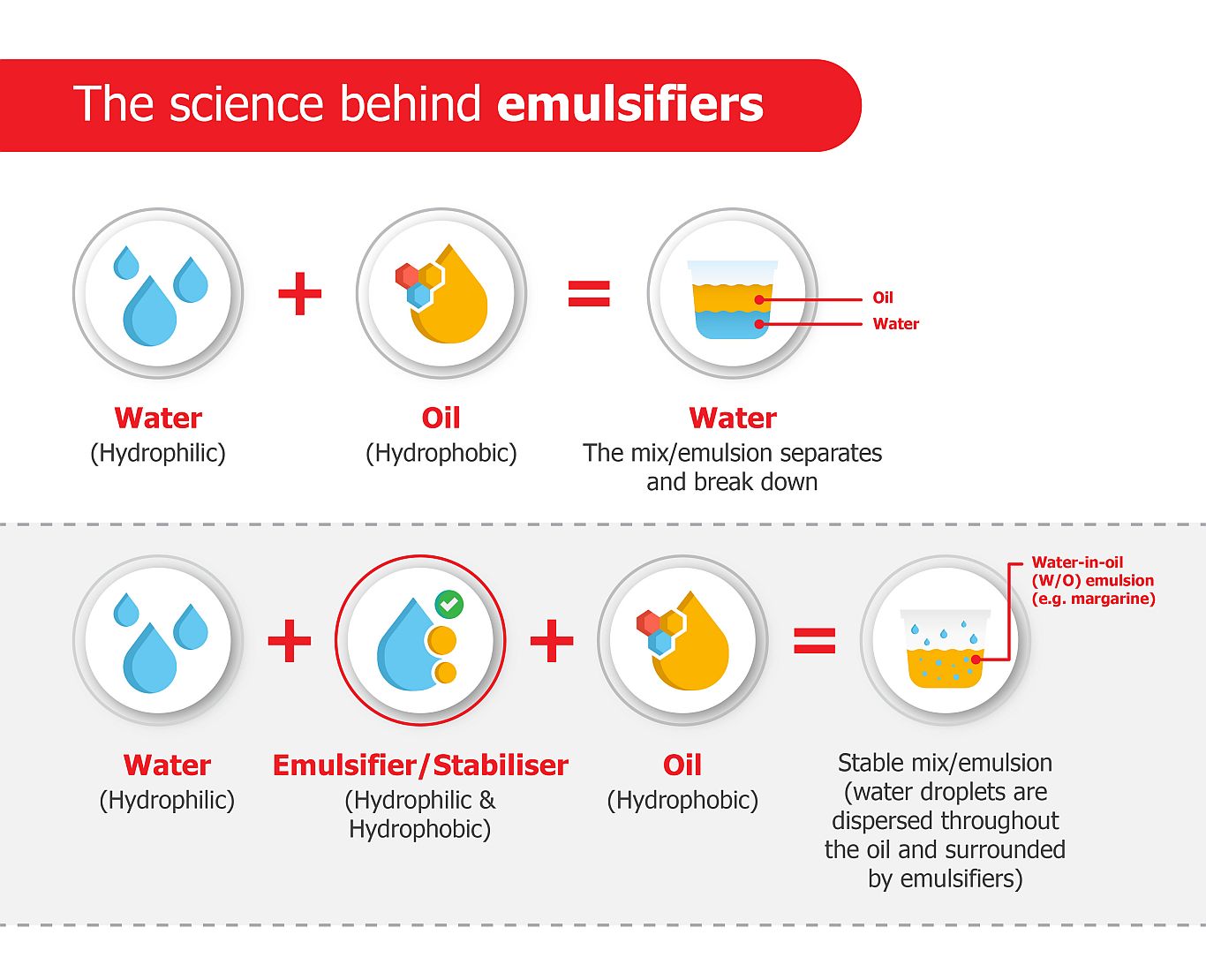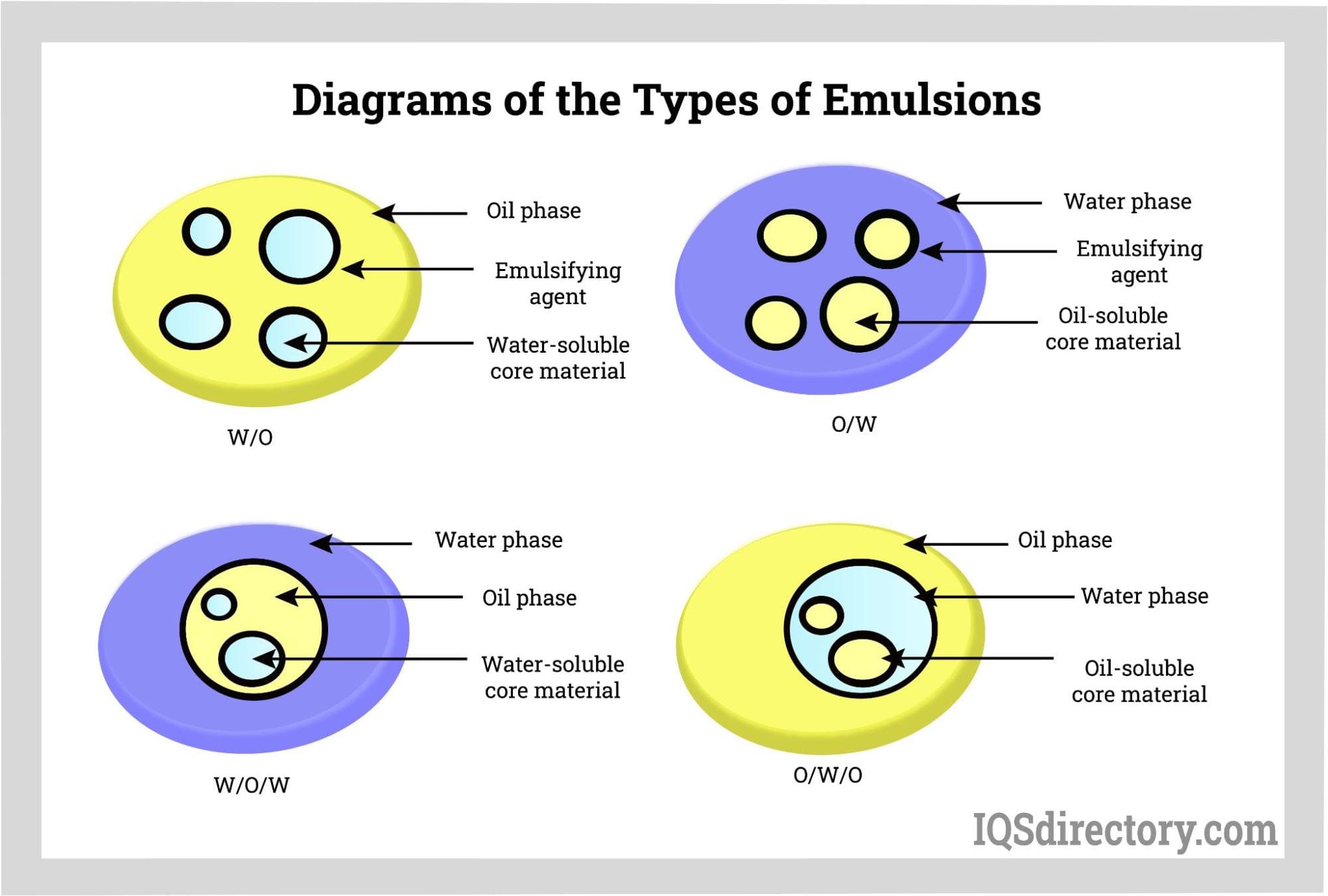The Science Behind Emulsifiers and Their Significance in Modern Manufacturing
Emulsifiers play an essential duty in modern-day production, functioning as the unrecognized heroes that blend oil and water for a vast array of products. You might not realize just how these compounds boost structure and stability, but their impact is substantial throughout industries. As customer choices shift towards cleaner tags, the need for ingenious emulsifiers is expanding. What does this mean for the future of product formula? Let's explore even more.
What Are Emulsifiers?
Emulsifiers are vital representatives worldwide of food and product manufacturing, working as the glue that binds two or else immiscible fluids, like oil and water. You may not realize it, but these substances play an important duty in developing stable combinations. They lower the surface tension between these fluids, allowing them to mix seamlessly. Common examples consist of lecithin found in egg yolks and soybeans, and mono- and diglycerides used in different processed foods.

When you work up a salad clothing or delight in a creamy dessert, emulsifiers aid maintain that excellent texture. They assure your products have a regular mouthfeel and appearance, improving your general experience. Without emulsifiers, several foods would certainly separate, leading to undesirable structures and flavors. Next time you enjoy a smooth sauce or spread, bear in mind the unhonored heroes-- emulsifiers-- that make it all possible.
The Chemistry of Emulsification
When you blend oil and water, you may discover they don't mix quickly; that's where the chemistry of emulsification comes into play. To conquer this difficulty, emulsifiers are utilized.
These molecules have a hydrophilic (water-attracting) head and a hydrophobic (water-repelling) tail. When you include an emulsifier, its molecules position themselves at the oil-water user interface, minimizing surface area tension and permitting the beads to mix. The emulsifier creates a protective layer around each bead, avoiding them from coalescing back right into separate layers. Recognizing this chemistry is crucial for achieving security in products like dressings, lotions, and sauces, making emulsification crucial in contemporary manufacturing.
Kinds Of Emulsifiers
Various types of emulsifiers play essential functions in maintaining combinations of oil and water. You'll commonly run into 2 major classifications: natural and synthetic emulsifiers. All-natural emulsifiers, like lecithin from egg yolks or soy, are stemmed from plants and pets, making them popular in food products. They're normally thought about safer and much healthier alternatives.
On the other hand, artificial emulsifiers, such as mono- and diglycerides, are chemically engineered to enhance security and life span. They're generally used in refined foods and aesthetic items.
In addition, you may come across non-ionic, anionic, and cationic emulsifiers, each with one-of-a-kind residential properties that affect their efficiency. Non-ionic emulsifiers, as an example, work well in a large range of pH levels, while anionic emulsifiers have a tendency to carry out better in alkaline problems. Understanding these kinds can aid you select the ideal emulsifier for your particular application.
Devices of Solution Development
Comprehending exactly how emulsions form is necessary for producing stable mixtures of oil and water. When you introduce an emulsifier, it minimizes the surface area tension between the two liquids, permitting them to blend even more quickly.
The emulsifier molecules have a hydrophilic (water-attracting) head and a hydrophobic (oil-attracting) tail. When you include an emulsifier, these molecules i loved this organize themselves at the oil-water user interface.
Applications of Emulsifiers in Numerous Industries
Emulsifiers play a vital role across different industries, making your favored foods smoother and much more satisfying. In cosmetics, they improve product appearance and stability, making sure a positive application experience. And also, in drugs, Clicking Here they aid supply necessary ingredients properly, improving general efficacy.
Food Sector Makes Use Of
While you may not understand it, emulsifiers play a crucial duty in the food market, improving the structure, stability, and shelf life of several items. In baked products, emulsifiers enhance dough handling and retain wetness, resulting in a better structure and prolonged quality. By guaranteeing harmony and quality, emulsifiers are considerable to supplying the tasty items you enjoy every day, making them an indispensable ingredient in modern food manufacturing.
Aesthetic Formulas Benefits
When it comes to aesthetic formulas, emulsifiers are important for developing products that feel luxurious and execute properly. You'll see that emulsifiers boost product stability, avoiding separation and prolonging shelf life. Generally, emulsifiers play a vital function in supplying high-grade cosmetic products that satisfy your charm requirements.
Pharmaceutical Applications Introduction
In the pharmaceutical market, emulsifiers are essential for formulating reliable drugs. You'll discover emulsifiers in numerous dosage kinds, like creams, ointments, and liquid suspensions, improving the bioavailability of medicines.
The Influence of Emulsifiers on Product High Quality

By ensuring secure emulsions, you lower the risk of wasting and extend shelf life, inevitably saving you money and time. You'll likewise find that emulsifiers can boost the bioavailability of energetic ingredients in your products, making them extra efficient for consumers.
In addition, they enable you to produce innovative formulations that meet diverse consumer demands. Whether you're crafting a creamy dressing or an extravagant cream, emulsifiers are vital for attaining the preferred outcomes. Basically, by comprehending and leveraging the effect of emulsifiers, you can greatly raise the top quality of your products.
Future Fads in Emulsifier Advancement
As the need for cleaner labels and sustainable products rises, the advancement of new emulsifiers is readied to develop substantially. You'll discover a shift towards plant-based and natural emulsifiers, driven by consumer choices for active ingredients that are environmentally pleasant and less processed. Innovations in biotechnology will likely improve the performance and effectiveness of these emulsifiers, allowing manufacturers to produce stable formulations with less additives.
You could likewise see a rise in multifunctional emulsifiers that not just stabilize solutions however likewise improve flavor, texture, or nutritional worth. This fad might streamline component lists while enhancing item efficiency.
Additionally, with advances in nanotechnology, emulsifiers might be engineered at the molecular level to accomplish extraordinary stability and effectiveness. Emulsifiers. As you discover these trends, you'll find that the future of emulsifier development is not simply concerning functionality, however likewise regarding welcoming sustainability and transparency in active ingredients
Frequently Asked Questions
Are Emulsifiers Safe for Consumption in Food Products?
Yes, emulsifiers are typically risk-free for intake go to these guys in foodstuff. They've been thoroughly studied and authorized by food security authorities, so you can appreciate your favorite foods without fretting about their effect on your health and wellness.
Can Emulsifiers Be Derived From Natural Sources?
Yes, you can acquire emulsifiers from all-natural resources. Components like lecithin from egg yolks or soybeans and casein from milk prevail. These all-natural emulsifiers aid support mixes without artificial ingredients, making them popular in various items.

Exactly How Do Emulsifiers Influence Life Span of Products?
Emulsifiers support combinations, avoiding separation and perishing - Emulsifiers. By preserving uniformity, they extend products' service life, making sure quality and top quality. You'll discover that emulsifiers help keep your preferred foods and cosmetics carrying out more than time
What Are Possible Adverse Effects of Emulsifiers?
You could experience digestion problems when consuming products with emulsifiers, as they can disrupt digestive tract germs. Some research studies suggest prospective links to swelling or allergic reactions, however extra research is required to fully understand these impacts.

Are There Alternatives to Traditional Emulsifiers?
Yes, there are options to standard emulsifiers. You can discover alternatives like natural gum tissues, starches, or lecithin. Each alternative deals unique residential properties, so experiment to find what works best for your details application.